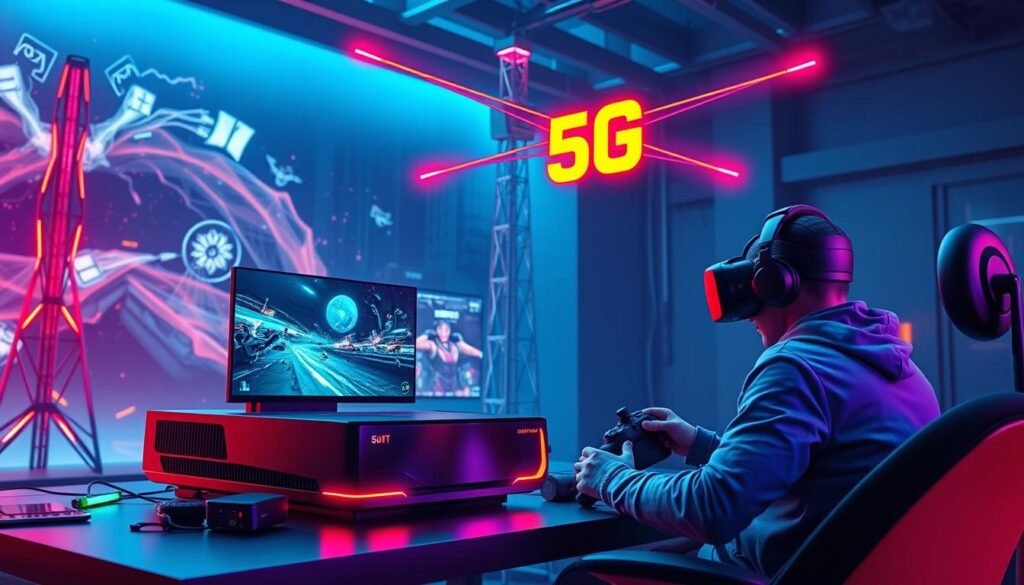Imagine a world where your online gaming is fast and lag-free. This dream might come true with 5G technology. But, the reality of 5G for gaming is not all good. It can offer speeds from 40 Mbps to 300 Mbps, meeting some gaming needs1. Yet, it also has challenges that could affect your gaming.
In this article, we’ll look at the good and bad sides of 5G for gaming. We’ll talk about the ups and downs of its connections, latency, and data limits. We’ll also compare 5G to traditional internet options to find the best for gaming.
Key Takeaways
- 5G home internet can deliver speeds up to 300 Mbps, but latency fluctuations and network congestion during peak times can negatively impact gaming performance.
- Latency spikes in 5G internet can disrupt real-time interactions in multiplayer games, while data caps can limit game downloads and streaming.
- 5G network providers prioritize cell phone users over home internet users, affecting speed and reliability during high-demand periods.
- Despite its potential for low latency and high speeds, 5G home internet may not be the optimal choice for serious gamers who require consistent, high-performance internet.
- Fiber and cable internet options may offer more reliable and consistent experiences for online gaming compared to 5G home internet.
The Reality of 5G Internet Gaming
5G technology promises faster speeds and lower latency for gaming. But, the reality can be different. One big challenge is the inconsistent connection during peak times2.
When many users stream and play games in the evenings, 5G networks get crowded. This leads to slower upload speeds and higher latency. These issues can ruin the gaming experience, especially for live streamers.
Too Much Latency Fluctuation
Another problem with 5G for gaming is the changing latency2. While 5G latency can be as low as 17 milliseconds in some places, it’s usually between 29ms to 33ms in the UK. This is better than 4G but still can be unpredictable.
This unpredictability can make gaming hard. It can disrupt your game and make it tough to stay competitive.
Lower Priority Than Cell Users
5G home internet users might find their connection slower than mobile users. Network operators often focus on their mobile customers first. This can make 5G home internet slower and more laggy during busy times.
Data Caps on 5G Plans
Many 5G home internet plans have data limits3. This is a big worry for gamers who use a lot of data. Even though 5G can offer speeds up to 265Mb/s, data caps can limit gaming time. This is especially true when streaming or downloading big files.
While 5G technology is promising for gaming, the reality is mixed. Challenges like network congestion, latency changes, and data limits can affect gaming. Researching 5G home internet providers is key for gamers to find the best performance for their needs23.
Is 5G Internet Good for Gaming?
5G technology has changed the gaming world. It offers fast speeds and less lag, making games better4.
5G Network Advantages for Gaming
5G has faster speeds and less lag, making games smoother4. It also means quicker downloads and less waiting during games4. Plus, it supports more players and brings new experiences like VR and AR4.
Limitations of 5G for Gaming
5G has its downsides too. Coverage and cost can be issues4. Network stability and security are also concerns4. Devices need to be 5G compatible, and it might not last forever4.
Data caps and network rules can also affect gaming4. Whether 5G is good for gaming depends on many things. Cable or fiber might still be better for some looking for the best experience4.

| 5G vs 4G for Gaming | Advantages | Limitations |
|---|---|---|
| 5G |
|
|
| 4G |
|
|
Choosing between 5G and broadband depends on what gamers need. 5G offers big benefits but might not be the best for everyone54.
5G vs Fiber and Cable Internet for Gaming
Choosing between 5G, fiber, and cable internet is key for gamers. 5G promises fast speeds but may not always provide the steady performance needed for smooth gaming6.
5G home internet relies on Fixed Wireless Access (FWA) technology. This tech uses radio waves that can be blocked by buildings and trees. This can lead to unreliable and intermittent connections, especially when many people are online at the same time6.
Fiber internet, like what Astound offers, gives more consistent speeds and avoids network congestion found in 5G6. It also has lower latency, which is vital for gaming. Fiber’s latency is as low as 5 milliseconds, compared to 20-50 milliseconds for broadband and over 100 milliseconds for wireless internet7.
Fiber internet is the clear winner for gaming performance. It offers symmetrical upload and download speeds of up to 1 Gbps7. This is much faster than 5G’s 20 to 75 Mbps range6. Fiber users also get 90% or more of their advertised speeds7, unlike cable and DSL users who get less7.
For competitive gamers and e-sports athletes, fiber’s consistent performance and low latency are big advantages in tournaments7. Households with many users also benefit from fiber’s high bandwidth. This allows for many high-demand activities at once without slowing down gaming7.
In summary, while 5G has fast speeds, fiber internet is better for gaming. It offers reliable connectivity, lower latency, and faster, more consistent performance.
Conclusion
5G internet seems promising for gaming with its fast speeds8 and low latency9. But, there are some issues that gamers need to think about. These include unstable connections, changing latency, and data limits.
These problems can cause lag and stuttering. They can ruin the flow of fast-paced games. This can make gaming less enjoyable.
But, 5G technology is getting better. 5G home internet is still a good choice for many gamers. It works well in areas with strong 5G signals.
Whether 5G is good for gaming depends on what each gamer needs. As 5G improves, more gamers will use it. But, they should also know its current limits.
By keeping up with 5G updates, gamers can enjoy its benefits. They can also adjust their setup to deal with its current issues. This way, gamers can find a balance between 5G’s promise and what it can do now.
FAQ
What are the key advantages of 5G for gaming?
What are the limitations of 5G for gaming?
How does 5G home internet compare to fiber and cable internet for gaming?
Source Links
- Is 5G home internet good for gaming? – https://www.astound.com/learn/internet/is-5g-good-for-gaming/
- Is 5G good for gaming? – https://5g.co.uk/guides/5g-gaming/
- 5G broadband for gaming – what are the benefits and why you might want to switch – https://www.techradar.com/computing/wi-fi-broadband/5g-broadband-for-gaming-what-are-the-benefits-and-why-you-might-want-to-switch
- Is 5G Good For Gaming? – https://www.glimp.co.nz/is-5g-good-for-gaming
- Verizon 5G Home Internet Review: Can It Handle Your Household Broadband Needs? – CNET – https://www.cnet.com/home/internet/verizon-5g-home-internet-review/
- 5G Home internet has taken the broadband world by storm, but is it better than a fiber internet connection? Check out our take. – https://www.cnet.com/home/internet/fiber-optic-versus-5g-why-the-wired-connection-still-reigns/
- Why Fiber Internet is Better for Gamers – Hunter Communications – https://hunterfiber.com/why-fiber-internet-is-better-for-gamers/
- Is 5G Home Internet Good for Gaming? Exploring the Benefits and Drawbacks – https://medium.com/@adengul97/is-5g-home-internet-good-for-gaming-exploring-the-benefits-and-drawbacks-f3488c610b3
- The Impact of 5G on Mobile Gaming – The Fix Phone Repair – Computer and Tablet Repair – https://thefixsolutions.com/the-impact-of-5g-on-mobile-gaming/

